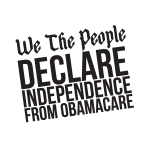 by David Aikman - OneNewsNow Columnist - 8/11/2009
by David Aikman - OneNewsNow Columnist - 8/11/2009It is clear now that President Obama's proposals for overhauling the U.S. healthcare system – currently taking the form of bills in the House and Senate – have turned into the first major political battle of his administration. Though the Congress is in recess for the remainder of the summer and cannot make progress on the bills, members of the House who have returned to face their constituents in town hall meetings have been exposed to some lively hectoring and debates over the merits of the proposed changes.
Americans are clearly greatly stirred up over the issue of healthcare. During the 2008 presidential campaign, Democratic candidates rode a crest of public demand for changes in the American system. Critics complained that too few Americans were covered by medical insurance (the number of uninsured today is purported to be about 46 million), that premiums were too expensive, and that insurance companies had too much control over the treatment that physicians recommended for patients. Democratic voters overwhelmingly supported drastic changes in the existing system.
When he first unveiled his proposed changes in early spring, President Obama muddied the waters by making two mutually contradictory assertions. "The status quo" in the American healthcare system, he said, was "untenable." He nevertheless added that if people were happy with the healthcare they had, they wouldn't have to change it. "If you are happy with your plan and with your doctor, you can stick with it," he stated. (In fact, polls show that 68 percent of Americans who have health insurance describe it as "good" or "excellent.")
If one looks closely at some of the bills currently on the legislative table, however, the assurances that change will not be coming is certainly not literally true. First of all, Obama's healthcare plan is anticipated by the administration itself to cost $950 billion over a ten-year period, the revenue to be raised by the combination of savings allegedly from a "more efficient" management of Medicare for the elderly and a tax increase on "rich" Americans that will yield, supposedly, $800 billion.
 Tinkering with Medicare to make it more efficient may seem a simple thing, but many seniors understandably worry that their own "guaranteed" healthcare in their retirement years could be trimmed down by cost restraints that will, in effect, create "rationing."
Tinkering with Medicare to make it more efficient may seem a simple thing, but many seniors understandably worry that their own "guaranteed" healthcare in their retirement years could be trimmed down by cost restraints that will, in effect, create "rationing."
As an Illinois state senator, Barack Obama was far more radical than he has been as candidate or as president, stating in a 2003 interview that he favored "single payer" insurance, the most radical form of all nationalized healthcare. While he has backed away from that, his watered-down proposal for a series of "exchanges" at the state level -- which would enable the uninsured both to access a variety of insurance options and receive taxpayer-supported "discounts" on the fees they have to pay -- would be no less dangerous to existing private insurance companies.
To put it simply, if a consumer is given the option of private corporation insurance or a "cooperative" system of insurance and is guaranteed the ability to pay for it, he will choose the "cooperative" (i.e., government-run) option. But if he does so, the ordinary free-market system determining price and cost will be fatally undermined. Essentially, the private insurance companies will be unable to compete with government-subsidized programs. Given the high consumer demand for medical services and the limited funding available to pay for them, medical rationing will come into effect.
 President Obama has praised the British National Health Service as spending about half as much on healthcare per citizen as the U.S. does. That is true. However, he fails to mention that British survival rates from various forms of cancer are drastically lower than American rates for the simple reason that the U.K., along with all European countries, rations available treatments. According to the Concord Study (conducted in 2008), survival rates for women with breast cancer were 84 percent in the U.S., compared with 73 percent in Europe; and for men with prostate cancer, 92 percent versus 57 percent. What American male at risk for prostate cancer would voluntarily select a healthcare system that offered him only a 57 percent chance of survival?
President Obama has praised the British National Health Service as spending about half as much on healthcare per citizen as the U.S. does. That is true. However, he fails to mention that British survival rates from various forms of cancer are drastically lower than American rates for the simple reason that the U.K., along with all European countries, rations available treatments. According to the Concord Study (conducted in 2008), survival rates for women with breast cancer were 84 percent in the U.S., compared with 73 percent in Europe; and for men with prostate cancer, 92 percent versus 57 percent. What American male at risk for prostate cancer would voluntarily select a healthcare system that offered him only a 57 percent chance of survival?
Ironically, the British system -- which sometimes quite arbitrarily decides which medicines and procedures are to be paid for by the taxpayer-funded system -- is called NICE (National Institute for Health and Clinical Excellence). Some decisions by NICE are not so nice; they are, in fact, fatal for patients.
Americans are often impatient with complicated details of national legislation proposed for them, but they are not stupid. They sense that the personal stakes in Obama's proposed healthcare reform are immense. That is why they have subjected homecoming representatives to often angry and noisy receptions. Speaker of the House Nancy Pelosi has termed such displays of emotion as "un-American." Ms. Pelosi, they are nothing of the sort -- rather they are democracy at work.
COPYRIGHT AMERICAN FAMILY NEWS NETWORK 2009
Dr. David Aikman was a journalist with TIME Magazine for 23 years, and is now a professor of history at Patrick Henry College in Virginia. He has authored more than a dozen books, including "Jesus in Beijing" (Regnery, 2003), "Billy Graham: His Life and Influence" (Thomas Nelson, 2006) and "The Delusion of Disbelief" (Tyndale, 2008). His latest book, "The Mirage of Peace" (Regal), is due for release in September. Aikman is also the founder of Gegrapha, an international fellowship for Christians in the mainstream media.
Opinions expressed in 'Perspectives' columns published by OneNewsNow.com are the sole responsibility of the article's author(s), or of the person(s) or organization(s) quoted therein, and do not necessarily represent those of the staff or management of, or advertisers who support the American Family News Network, OneNewsNow.com, our parent organization or its other affiliates.
All Original Content Copyright 2006-2008 American Family News Network - All Rights Reserved.

 Oldies
Oldies
 Harrolds.Blogspot.com
Harrolds.Blogspot.com











 Legislation Pending in Congress
Legislation Pending in Congress







No comments:
Post a Comment
Please, avoid posting advertisements. Content comments are welcomed, including anonymous. Posts with profanity will not be published.